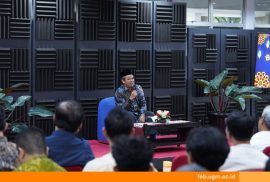Online gambling has become a major threat to Indonesian society. The Minister of Higher Education, Science and Technology, Satryo Soemantri Brodjonegoro, revealed that approximately 960,000 university students are involved in online gambling practices.
Banking, Finance, and Investment Analyst and FEB UGM Management Lecturer, I Wayan Nuka Lantara, Ph.D., stated that online gambling is not new. With the advent of the Internet and rapidly evolving technology, online gambling is now more accessible to all groups.
Driving Factors
He outlined several factors that make online gambling so appealing. “First, the massive accessibility enabled by technology, allowing games to be played anywhere, anytime. Then, the attractive and user-friendly interfaces. Finally, the flexible payment methods, whether via wire transfer or e-wallets,” he told reporters during the FEB UGM Expert Talks event on Monday (25/11/2014) at the FEB UGM Public Relations Office.
Wayan cited a study by Populix entitled “Understanding the Impact of Online Gambling Ads Exposure”, which found that 63% of respondents frequently saw online gambling ads while using the Internet. The ubiquitous presence of online gambling advertising on social media also makes young people more vulnerable to exposure.
In addition, Wayan noted that social environments and peer influence are among the factors driving the prevalence of online gambling. Often, online gambling begins as an experiment with small stakes, especially when individuals experience fear of missing out (FOMO).
“However, the algorithmic system designed to make players feel comfortable often gives them small wins initially. This encourages them to keep increasing their stakes, eventually leading them into a cycle of addiction,” he added.
The Impact of Online Gambling
Wayan noted that many online gamblers know the odds of beating the house are slim. However, uncontrollable emotions and phenomena such as predisposition bias push them to continue playing despite losing. Even after losing, online gamblers try again, believing they can reverse their luck until they run out of money.
“At some point, this gambling activity can change a person’s personality,” he explained.
Online gamblers who become trapped in a gambling disorder or addiction often lose control of themselves. They continue to play, hoping for a big win, even in dire situations.
“Like a vicious cycle, this habit is hard to break without strong willpower or the intervention of others,” he said.
In addition to the psychological effects, the negative consequences of online gambling are becoming more widespread. These include economic strain, disruption of family harmony, increased crime rates, and even suicidal tendencies.
Prevention
Wayan emphasized that solving the problem of online gambling requires a multi-sectoral approach. Primary prevention starts with the individual or online gambler. In addition, families, the environment, and the government all have a role to play in preventing online gambling.
“Parents are expected to be more aware of their children’s activities, including what they do when they access the Internet,” he said.
Efforts to prevent online gambling include educating people about its dangers. The promotion of financial literacy and financial inclusion should accompany this. Education should target individuals, especially young people, on how to use social media wisely.
“Financial literacy education also needs to be applied early, using appropriate approaches such as using social media as an educational medium, so that they can distinguish between healthy and harmful investments,” he said.
So, how can online gambling be eradicated? Wayan suggested that the government should take decisive action by targeting high-level operators. He explained that uncovering just one major case could serve as shock therapy to suppress such activities.
“Hopefully, the government will act quickly because no matter how strong the educational efforts are, if the transactions continue to grow exponentially, the impact will become increasingly difficult to control,” he concluded.
Reporter: Shofi Hawa Anjani
Editor: Kurnia Ekaptiningrum
Sustainable Development Goals









